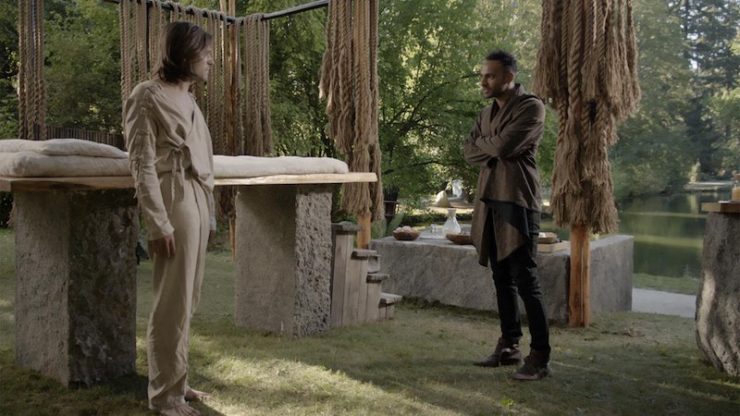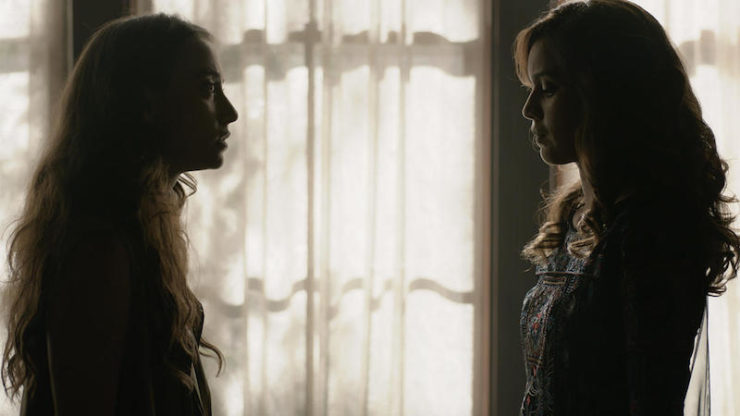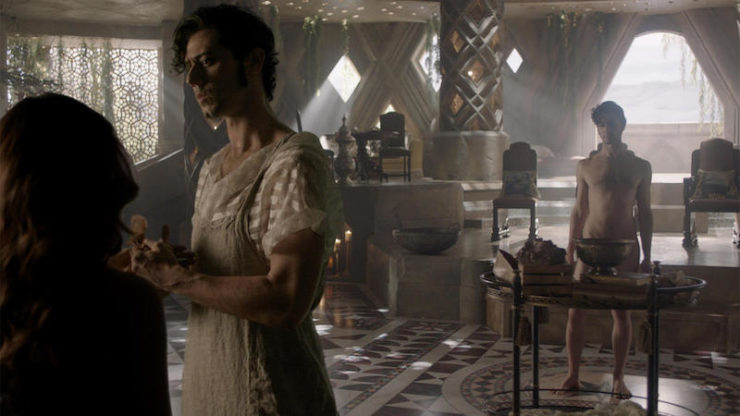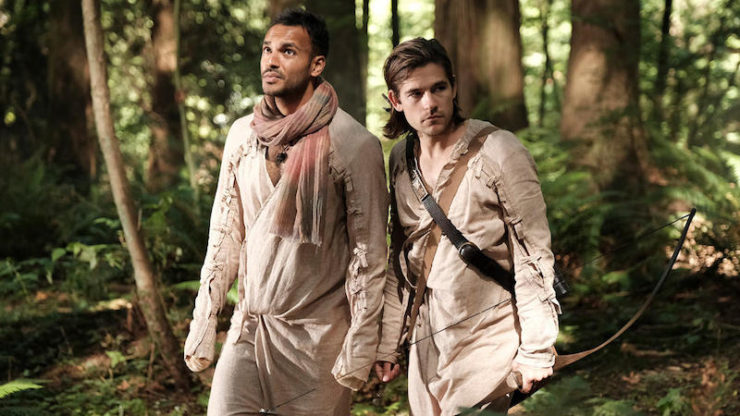“Now magic is failing on earth, because of shit. Proving once again that comedy and tragedy can coexist in the same goddamn sentence.”
Dean Fogg with The Magicians’ thesis statement, everybody! This week’s episode is prime Magicians: goofy set pieces involving body doubles and stoner trees mixed with really heavy emotional work. After last week’s wrenching battle, our semi-heroes are in difficult places, each facing hard truths about themselves. “The Flying Forest” is very much about grief, about physical healing, emotional struggle, making dubious choices, maybe getting high to erase all the feelings for a while, and coming back down to face the thing that never goes away: you.
Since everyone’s facing their demons this week, everyone has a line or a moment that sets up where they’ve been and where they’re headed—which makes this as good a time as any to check in with our children of Earth one character at a time.
Quentin
“You would find your way back to sadness, no matter how far you run from it.”
Quentin’s moment, unlike everyone else’s, isn’t his line; the quote above is the magical creature the White Lady, pretty much nailing it. But before that, there’s a silent moment that tells us everything about Quentin’s mental state: him, collapsing, when he and Penny make their way out of the Flying Forest and everything comes back to him in a rush.
(The stoner Forest was revealing for Quentin; take away everything he knows, and he reverts to thinking he’s the great white hero, saving a girl, with his trusty manservant at his side. He’s got so much more work to do.)
Quentin, once again, is behind. His friends have had some time to process, to begin healing, but he’s been unconscious for three weeks, his healing only physical. Everything is fresh for him—as it is for Penny, who’s been hopping uncontrollably between worlds. It’s extra fitting that these two wind up needing each other; they’ve been out of commission, they resent each other, and they need help more than ever.
And neither of them would’ve succeeded on this quest alone. Quentin knew to hunt the White Lady; Penny gave Q the spell that makes his aim true. The White Lady’s impatience is a wondrous thing. Penny’s request is simple: He wants his hands. Done.
Quentin’s wish is impossible. Magic, as he knows, has limits; so do magical creatures. But this one is onto him. “What is it, Quentin Coldwater, that you ache for?” she asks. “You have a crown and the power to reshape the very ether to your whim. What else could you possibly want?”
It’s telling that Quentin, despite everything, knows that he got everything he wanted, even if he couldn’t keep it. It’s also telling that the White Lady offers him something very like what Martin offered Julia: To take away his memories, freeing him from the pain. Even Quentin is smart enough to turn this offer down. But what he takes instead is not to move forward, but to go back. “Send me home,” he says, and she does: he appears in the middle of a Manhattan street, bow and all. On the plus side, maybe this is Q not running from his sadness, but going back to reality, where he’s always been sad. Being in Fillory wasn’t going to fix that. What will?

Penny
“Think about Alice. She needs you, man. I need you.”
It’s easy, sometimes, to forget everything Penny’s been through, to forget that he’s had the Beast whispering in his head since he was young. It’s no wonder he’s a touch prickly. But a reminder of how shitty his current situation comes when he appears in front of Margo, thoroughly freaked out. His hands are totally dysfunctional and very well might get him killed, and what’s the first thing he hears when he lands back in the right world? That Alice didn’t make it.
But at least it’s Margo, her face solemn, who tells him the news, and who is practical and smart and knows where to send him and his cursed hands: to the centaurs, who are apparently excellent doctors. Doctors who, it turns out, don’t want to risk the Riverwatcher’s curse transferring to them. This entire subplot is a more complicated version of what happens to Penny in the books, when he does lose his hands—but for good. Giving him a quest to get them back (and back under control) has given him something to do and kept him on the periphery of the main gang, and I’m all for that.
It’s also taken away much of his strength. Without hands, Penny can’t cast, let alone shoot an arrow, which is another reason he needs Quentin. These two keep playing the same frenemy game, where Penny is tired of hearing Quentin’s “low self-esteem shit” thoughts, and Quentin is tired of Penny giving him a hard time about it. They help each other resentfully, always in their own interest, and when things get really bad, we get a reminder of how resourceful and self-driven Penny is when he breaks his own arms to keep his hands from killing him.
And then, when he asks Q for the most terrible help, he still has to bully Quentin into being able to do what needs doing. That scene is ugly, even when you factor in the centaur booze. It’s not just Quentin who benefits from the mind-erasing nature of the Flying Forest; those were probably some really good distracting drugs for Penny as well. When everything comes back, though, it’s Quentin who collapses, and Penny who has to pick him back up again. It’s Penny who knows, because Quentin’s wards were slipping, how terrible Q feels. And who has to say something he really doesn’t want to say in order to get Quentin up and moving again:
“I need you.”
I think even Quentin knows what it costs Penny to say that. What it means for their relationship—for Penny’s role in whatever future Q has, or Fillory has—is yet to be seen.
Margo
“We owe it to her. Because we weren’t her friends.”
Margo’s a bitch, but she’s a practical bitch. She’s Fillory Clinton. She’s not letting Eliot pretend that he’s the only one responsible for the world they’ve found themselves in charge of: “My crown is just as heavy as yours.”
But she’s also got freedom that Eliot doesn’t have, and she knows it. Margo’s clever idea for how to get Eliot out of Fillory is this episode’s comedy-and-tragedy high point (which is saying a lot, given the Flying Forest and Eliot’s ire at being overthrown as the life of the party by freaking Todd).
It’s also a reminder that she’s a really, really good magician. Coy, blunt, catty, and vain, but also talented, quick-thinking, and, in the end, pretty smart about who she is and how the world works. She’s not wrong when she tells mopey Eliot that Alice wasn’t their friend. She’s not wrong when she rips into Julia, telling her everything that happened when they finally destroyed the Beast.
But neither is Julia entirely wrong when she defends herself, when she says they should have trusted her. We don’t know what would’ve happened if they’d let Julia use Martin to handle the Reynard situation first. We don’t know if she would’ve ever given Martin the magical knife or just used it on him after all. We don’t know how long her godly power lasts, or what other options they might’ve found for defeating the Beast. We only know that things played out as they did, and that, for better or worse, no one listened to Julia.
But Margo listens when Julia says, “You don’t have friends. You have people that are so afraid of you, they’d rather be on your side.” She listens when Julia says that killing Reynard isn’t just about revenge, that he’s killing women. She listens even though Julia is vicious about Margo’s self-centeredness.
And then she walks away, and you can see on her face that she didn’t know. That she didn’t understand that Reynard was more than just Julia’s problem. When she walks back and gives Julia the box that will make her life easier, she doesn’t say anything in her own defense. Nothing cutting. Nothing snide. She knows what’s true, and she knows when it matters. So when she goes back to Fillory and tells Eliot they do need to build a statue for Alice, she understands something new. They have to do it because they weren’t her friends, but she died for them anyway.

Julia
“Look, what Margo said about me was true.”
Every “previously on The Magicians” intro this season has included Reynard raping Julia, which is increasingly hard to watch. I think this is the point: to remind us that Julia has gone through hell, probably has PTSD, and shouldn’t be expected to just “get over it.” But this week the scene runs a little longer, and serves as a reminder that under those terrible circumstances, Julia tried to do something good. She tried to protect Kady.
Kady was still there for much of it, though, long enough to see Reynard murdering their friends, and to know what happened to Julia. She ran—and now we know where she’s been since then. Strung out and alone. When Julia finds her and gets her cleaned up (magical methadone must be seriously good stuff), Kady feels terrible. She meant to bring back help, but as Julia says, she couldn’t have helped then.
But she can help now. These two haven’t always gotten along, but they’re hardly Penny and Quentin, and as far as they know, they’re the only people standing against Reynard. Julia’s scrappy hedgewitch skills plus Kady’s partial Brakebills education make them a pretty formidable pair. Julia didn’t know what the number scratched into Marina’s arm was; Kady knows it the number for a book at Brakebills, but can’t go back to the school or alarms will go off. So Julia goes, and runs into Margo.
This encounter is is huge for Margo, but it’s heavy for Julia as well: Even if she thinks she’s right, that they should’ve trusted her, Alice is still dead. While Alice wasn’t Julia’s friend, Quentin is Julia’s friend—and she knows what Alice’s loss means to him. Margo has every right to say what she says to Julia. And like Margo, in the end, Julia takes the truth of what’s said to her and accepts it. She did fuck up. She did get people killed. But she has to keep fighting. Even though it would leave Julia entirely alone, she gives Kady an opening to bail, because Kady doesn’t owe her anything. But Kady doesn’t take it. “Best bitches,” indeed.
And while it’s not exactly about Julia’s character, I’d be remiss not to mention Kacey Rohl’s too-brief, entirely crushing, presumably final appearance as Marina. Panicked, wide-eyed, she can barely keep it together long enough to tell Julia what she needs to know—the piece of information so important that Marina, while she was dying, scratched that number on her arm, hoping that Julia would figure it out and revive her. Forty years ago, a girl banished Reynard. It’s possible. It won’t save Marina, or change what happened. But it’s possible.

Eliot
“I thought I’d die.”
I’ve saved Eliot for last because while all of these moments were entirely key, Eliot’s was more than that: it explained a lot of things that have happened with him since Mike’s death. One line—one admission—can’t correct late-season-one’s weaknesses; the show was trying to grapple with too much, and threads got dropped or tangled. Eliot’s was one of them, and the show’s done decent work toward … not fixing it, exactly, but clarifying what it meant to do.
Eliot broke my heart this episode. Sure, he got to admire his own “doppelbanger,” and he got to have inventive magical sex with his wife and a handsome welters player, on two worlds, at once. He got to face normal Eliot problems, like whether to flirt with Javier or regain his party-king crown from Todd. And all of that is well and good and necessary and, for Eliot, healing.
But then he goes to talk to Fogg.
Early in the episode, arguing with Margo, Eliot has a seemingly throwaway line about how he’s not ready to be king: “I’m not done being me!” It’s a straightforward enough complaint, and any of them might’ve made it. But the rest of them wouldn’t have said what Eliot says when Fogg asks what Eliot thought would happen when he dove headfirst into another world.
“I thought I’d die.”
Oh, Eliot. This is the thing. This is all of Eliot’s ignored pain at the end of last season, and the reason his demeanor was so strange when he took on the burden of marrying Fen and becoming High King. It was all unreal to him, still. He was just waiting for the magical world to kill him. But it hasn’t, and he’s the king, and Alice is dead, and a crown sits extra heavily on a man who didn’t think he’d be keeping it.
But he’s not carrying it alone. Bless Fogg and his practicality, and his concern for how it looks on him that his students went and took over another world. (“It reeks of Earth privilege.”) Will he actually be able to help? It his help only offered in order to keep magic functioning on Earth and thus Brakebills open? Does it matter? What matters to Eliot is that it’s hope. At least a little bit of hope.
SOME GOOD QUOTES FOR LEVITY’S SAKE
- “I know we’re being serious right now, but that surgeon has the biggest dick.”
- “Doing your clone is more like … AP level masturbation.”
- “’Let’s go hunt the White Lady?’ People like me get shot for saying shit like that.”
- “Forget all the mean shit I said to you earlier; the bronies can’t fix me. I need your help.”
- “Where are my stuff touchers?!??”
- “You can each have one wish or you can fuck off.”
Molly Templeton sincerely hopes they haven’t seen the end of Other Eliot.










